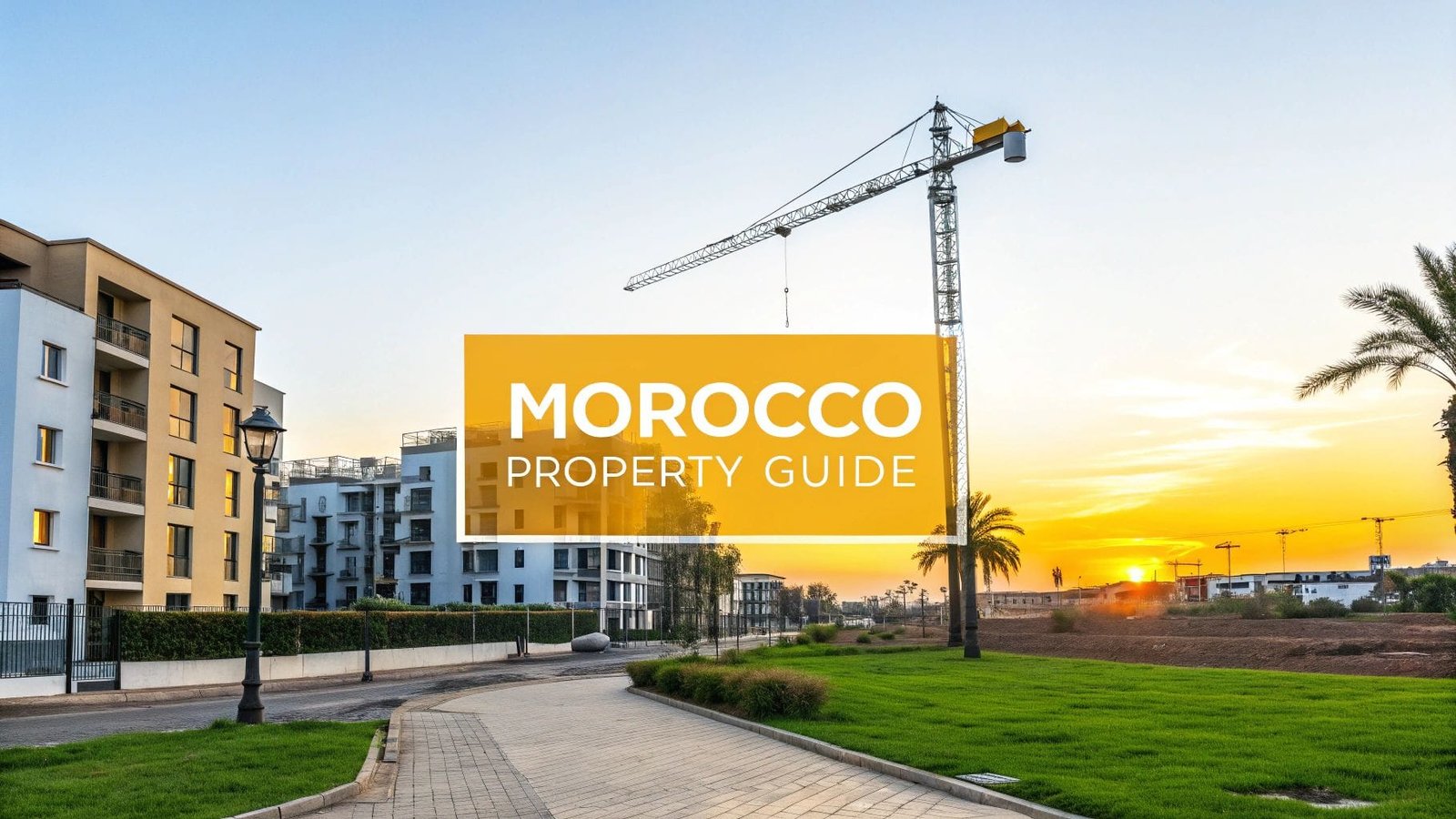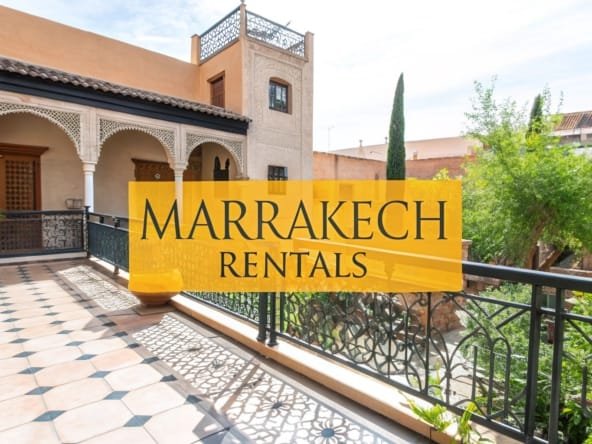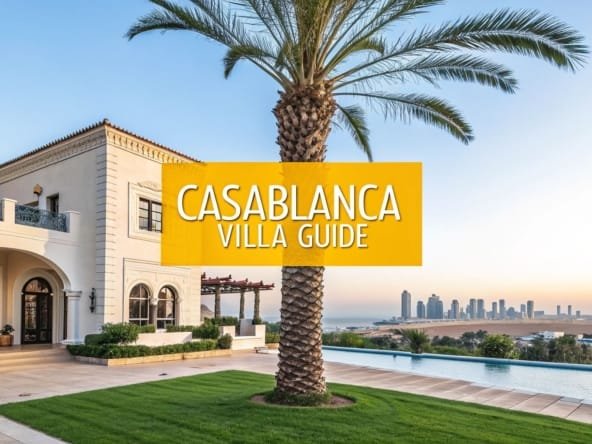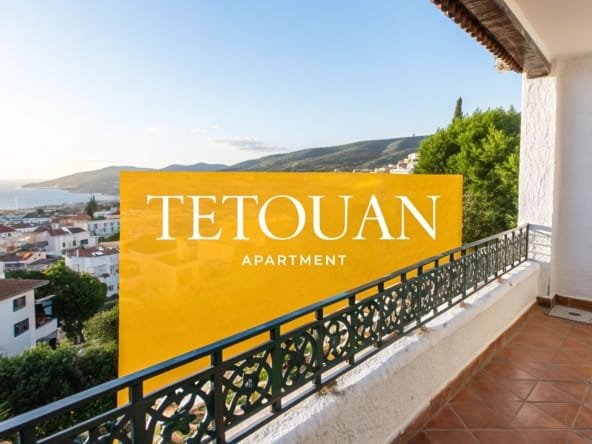Before a single dirham is spent or a single brick is laid, every successful Moroccan real estate project begins with a clear, strategic vision. This isn't just a preliminary step; it's the foundation upon which everything else is built. Getting this right from the start is what separates profitable ventures from costly mistakes.
Defining Your Moroccan Real Estate Vision
Jumping into a real estate project in Morocco is about much more than just building something. It’s about creating real value in a market that's as dynamic as it is culturally rich. The most successful investors I’ve seen don't start with blueprints; they start with a carefully considered strategy. This means taking a hard look at your goals, digging deep into market research, and being brutally honest about what you can afford.
The very first question you need to ask yourself is: what am I actually trying to accomplish here?
- Steady Rental Income? Maybe your goal is to build a portfolio of apartments in a bustling hub like Casablanca or Rabat, providing a reliable monthly cash flow.
- A Quick, High-Value Flip? Perhaps you're more interested in buying, renovating, and selling properties in tourist hotspots like Marrakech or Essaouira for a significant capital gain.
- Tapping into the Commercial Sector? Your vision might be to develop modern office or retail spaces to serve Morocco's expanding business community.
- A Personal Retreat and Investment? Many people look for a property that can be a holiday home while also growing in value, a common strategy in coastal gems like Agadir.
Your answer to this fundamental question will steer the entire direction of your projet immobilier maroc. It determines the property type, the ideal location, and the financial model you’ll need to make it work.
Scoping Your Project Realistically
With your main objective in mind, it's time to get specific. A vague idea like "I want to build apartments" is a recipe for failure. A well-defined vision sounds more like this: "My plan is to develop a 10-unit residential building with two-bedroom flats targeting middle-class families in Marrakech's Targa neighbourhood."
This level of detail is critical because it forces you to connect your idea to what people actually want and need. Let me give you a real-world example. An investor was set on building luxury villas in Marrakech, but the market was already saturated. After some digging, he discovered a completely underserved niche: smaller, eco-friendly modern villas near Agadir, perfectly suited for European retirees. By pivoting his vision, he tapped into a specific and profitable demand instead of fighting an uphill battle.
Defining your scope is really an exercise in balancing your ambition with the market's reality. The sweet spot is where what you want to build meets what the market is asking for—and what you can realistically afford to deliver.
Aligning Vision with Financial Capacity
Money is the ultimate reality check. You absolutely have to run detailed and conservative financial projections before you get too far down the road. This isn't just about the price of the land or an old riad; it includes a whole host of costs that first-timers often underestimate.
Your initial financial breakdown must account for:
- Acquisition Costs: The straightforward price of the land or existing property.
- Legal & Administrative Fees: Don’t forget notary fees, registration taxes, and permit costs. These can easily add 7-10% to your total.
- Construction or Renovation Costs: Get actual quotes from local contractors. A classic rookie error is to base estimates on costs from your home country, which almost never translate accurately.
- Contingency Fund: Set aside an extra 15-20% for the unexpected. I’ve seen it all—delays, sudden material price hikes, and unforeseen structural problems are just part of the game.
For instance, that charming little house in Chefchaouen for €25,000 might seem like a bargain. But once you add €8,000 for necessary renovations, €3,000 in legal fees, and a €5,000 "just-in-case" fund, your real initial investment is closer to €41,000. This simple calculation is what tells you if the project is viable from day one and helps you set goals that are actually achievable.
Getting to Grips with the Moroccan Real Estate Market
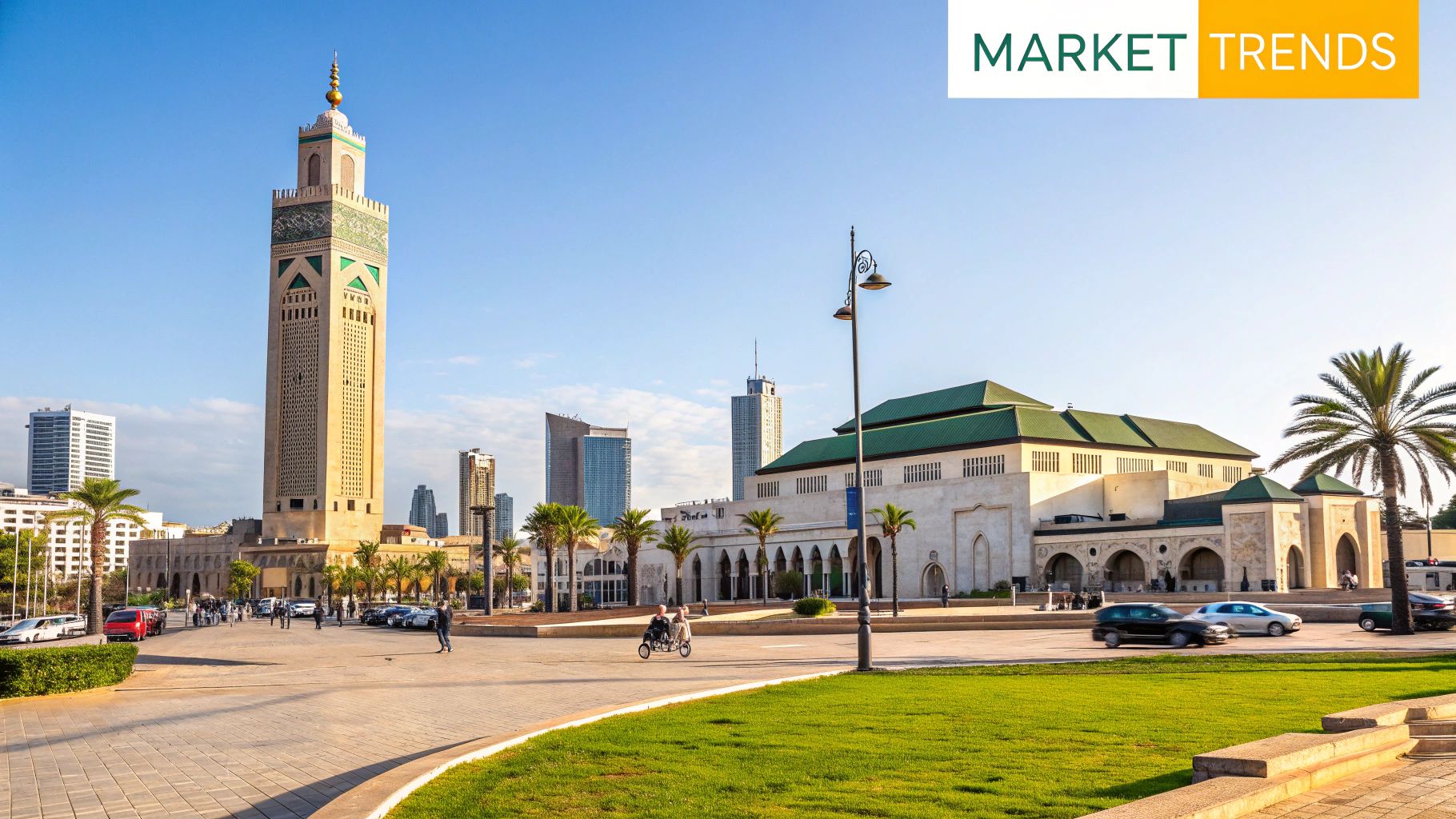
Once you've got a clear vision for your project, it’s time to ground it in the reality of the Moroccan property market. A successful projet immobilier maroc hinges entirely on a sharp, practical understanding of current trends, regional price differences, and what people are actually looking to buy. This isn't about guesswork; it's about making smart, data-driven decisions that align with where the market is actually heading.
You have to remember, Morocco’s real estate landscape is anything but uniform. The dynamics in a major economic hub like Casablanca are worlds apart from a tourist-magnet like Marrakech or a fast-growing coastal city like Tangier. Each one presents its own set of opportunities and challenges that you need to weigh up carefully.
Pinpointing the Key Investment Hubs
Casablanca remains the undisputed economic engine of Morocco. This makes it a consistently reliable—though highly competitive—market for any kind of real estate investment. The constant demand for both residential and commercial properties keeps it at the top of the list for many developers.
But don't overlook the other cities carving out their own powerful niches. Tangier, with its strategic port and massive industrial growth, offers huge opportunities in logistics and, crucially, housing for an expanding workforce. Down south, Agadir continues to pull in European retirees and tourists, which keeps demand strong for holiday homes and modern apartments.
Your choice of location has to be a direct reflection of your project's goals. If you're chasing long-term rental yields from business professionals, Casablanca is your prime candidate. For high-growth potential tied to tourism and international business, Tangier might just be the smarter play.
Think about it this way: an investor focused on affordable housing for young families might find better returns and far less competition in the growing suburbs of Rabat than in the saturated luxury market of Marrakech's Palmeraie. This granular level of analysis is what uncovers the real market opportunities. For a deeper dive into specific regions, check out our guide on how to invest in Morocco real estate.
Understanding Property Demand and Pricing
Knowing what to build is just as critical as knowing where. The data consistently shows a powerful demand for two and three-bedroom apartments. This makes sense, as they cater perfectly to the core needs of Morocco's growing middle-class families. While luxury villas certainly have their place, the real volume and stability are often found in these mid-range residential projects.
Pricing is where a detailed, street-by-street analysis becomes absolutely essential. The price-per-square-metre can swing wildly not just between cities, but between different neighbourhoods within the same city.
Let’s take Casablanca as a prime example of these micro-market dynamics. In 2025, we've seen average apartment prices in the city inch up to around 13,900 Moroccan dirhams (MAD) per square metre, a modest increase from 13,598 MAD in 2024. Meanwhile, the luxury villa market has held steady at an average of 20,500 MAD/m².
But the real story is in the neighbourhoods. High-demand zones like Sidi Maârouf (accounting for a massive 10.5% of all real estate searches) and the area around Casablanca Finance City (7%) are seeing prices inflate. Why? Simple supply and demand. These figures show you where capital is flowing and where scarcity is driving up value. A project in Sidi Maârouf, for instance, could justify a higher development cost because you know the potential for a premium sale price is there.
Turning Data into a Real-World Strategy
So, what does all this mean for your project plan? It’s about translating these raw numbers into actionable intelligence.
Here’s a simple way to think about it:
- High Price/m² with Low Supply: This signals a premium market. It’s likely the perfect spot for a high-end, smaller-scale development where top quality can command top prices.
- Moderate Price/m² with High Sales Volume: This suggests a stable, liquid market. This is often the sweet spot for mid-range residential projects aimed at local buyers who need financing.
- Low Price/m² with Rising Demand: This is your emerging area. Investing here carries more risk, but it also offers the highest potential for capital growth if you get in early.
For instance, if you notice that a particular neighbourhood in Agadir has seen a 15% jump in rental demand over the past year, while property prices have only crept up by 5%, that’s a flashing green light. It points to a strong opportunity for a buy-to-let investment. This is the kind of insight that moves a project from being a gamble to a strategically sound investment, positioning you for the best possible return.
Navigating Morocco's Legal and Administrative Path
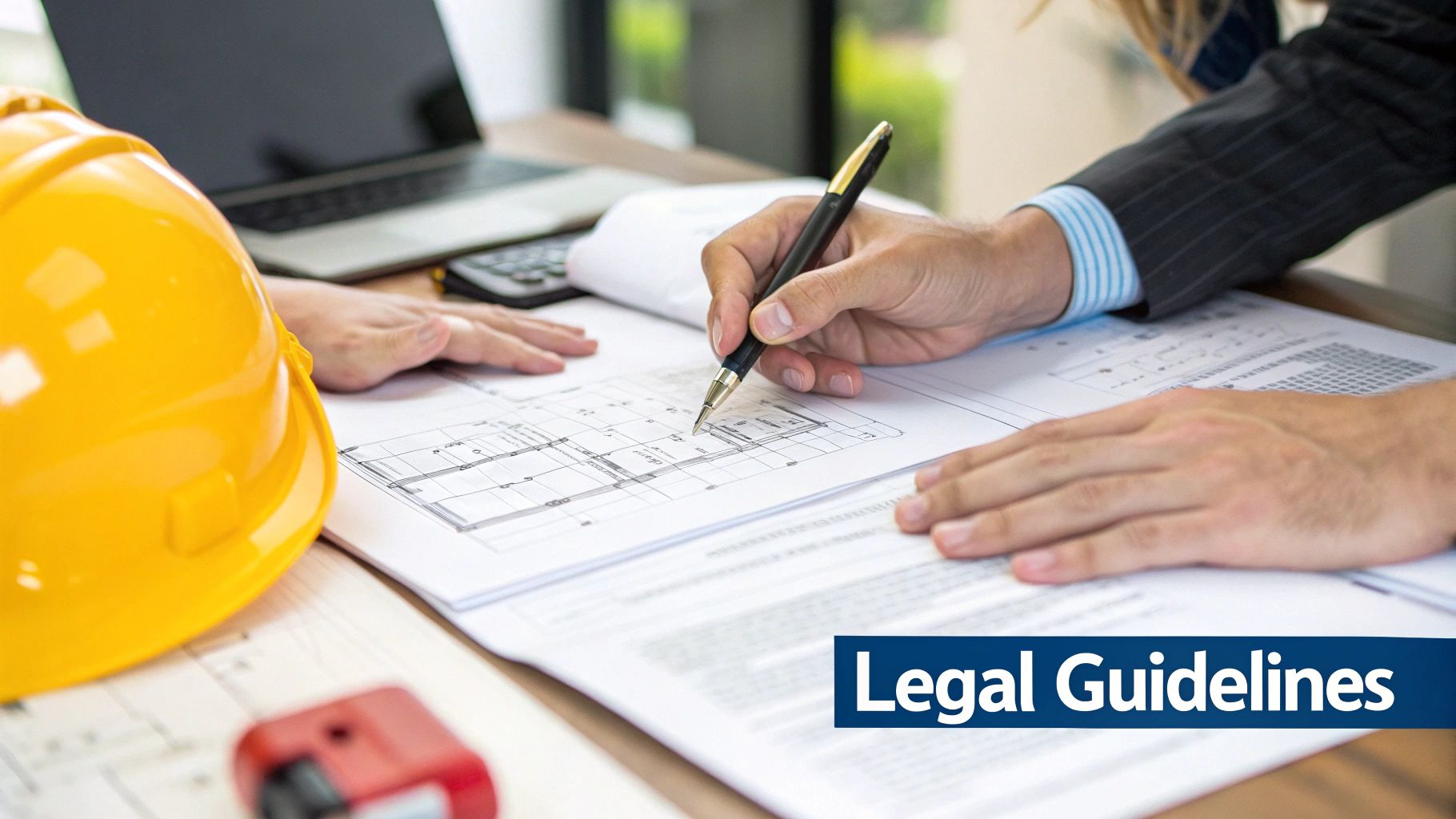
A successful projet immobilier maroc hinges on more than just a great location and solid financing. The real foundation of your venture is the legal framework, and getting this right from day one is absolutely non-negotiable. This is precisely where many promising projects either sail through smoothly or get hopelessly tangled in bureaucracy and costly delays.
It's best to think of the legal process not as a series of obstacles, but as a clear roadmap. Each step, from verifying land ownership to securing the final permits, is designed to protect your investment and ensure your project is built on solid ground—both literally and figuratively.
Verifying Property Titles and Zoning Laws
Before a single dirham changes hands, your first move must be a deep dive into the property's legal standing. In Moroccan real estate, the single most important document is the 'Titre Foncier'—the official land title. This is the definitive proof of ownership, registered and guaranteed by the national land registry agency (ANCFCC).
A clean 'Titre Foncier' is your assurance that the property's boundaries are correct, the surface area is confirmed, and it’s free of any hidden claims, mortgages, or legal disputes. I've seen investors lose hefty deposits simply because they skipped this step. One painful memory is of a client near Essaouira who discovered an unresolved inheritance claim only after committing funds—a problem a proper title search would have flagged immediately.
Equally critical are the local zoning laws, outlined in the 'plan d'aménagement'. This document is the rulebook for what you can and cannot build.
- It defines whether the land is zoned for residential, commercial, industrial, or other uses.
- It details specific limitations like building height, how much of the plot you can cover, and required setbacks from the property line.
- It might also show designated green spaces or future public infrastructure that could completely alter your plans.
Ignoring the 'plan d'aménagement' is a rookie mistake that can kill a project before it even starts. You can't just buy a plot and assume you can build a ten-storey apartment block; the local urban agency has the final word.
The Notary's Central Role in Transactions
In Morocco, a notary ('notaire') isn't just a legal advisor you can choose to hire; they are a government-appointed official who plays a mandatory and central role in every property transaction. The notaire is legally responsible for drafting the official deeds, verifying every aspect of the transaction, and ensuring all taxes are paid correctly.
Think of your notary as a neutral referee whose main job is to ensure the entire deal complies with Moroccan law. They are, without a doubt, your most important ally in securing your property rights and steering clear of legal trouble.
The notary handles everything, from drafting the preliminary sales agreement ('compromis de vente') to registering the final deed. They will also collect and pay all the necessary registration duties and land conservation taxes for you. Getting a clear picture of these costs upfront is vital for accurate budgeting. Our detailed guide breaks down all the notary fees in Morocco you should plan for.
Establishing a Legal Structure for Your Project
For any serious projet immobilier maroc, operating as an individual is rarely the best approach. Setting up a formal legal entity is key to protecting yourself from liability and can also open the door to tax advantages. The two most common structures developers use are the SARL and the SA.
SARL (Société à Responsabilité Limitée)
- This is a limited liability company, much like an LLC in other countries.
- It's a popular choice because it’s relatively straightforward and inexpensive to establish.
- It's perfect for small to medium-sized projects, as it shields your personal assets from any business debts.
SA (Société Anonyme)
- This is a public limited company, built for larger, more complex developments.
- It has a higher minimum capital requirement and stricter governance rules.
- It’s the go-to structure if you're planning to raise significant capital from multiple investors.
The right choice really depends on the scale of your ambitions. If you’re building a small block of four rental units, the simplicity of a SARL is probably your best bet. But if you’re planning a large, multi-phase residential community, an SA provides the structure you need to bring in other investors. It’s always wise to sit down with a local lawyer and tax advisor to figure out which entity truly fits your project.
Securing Financing for Your Real Estate Project
Getting the right financing in place is what truly brings your projet immobilier maroc to life. It’s the engine that turns blueprints and market studies into a physical, profitable asset. This isn't just about asking a bank for a loan; it's about strategically matching your project's needs with the funding options available in Morocco's financial landscape.
The good news? The current lending environment is quite welcoming. The real estate sector is a cornerstone of the Moroccan economy, making up about 6.3% of the national GDP. A key driver for this is the accessibility of financing. For instance, 2025 mortgage rates started as low as 4.20% for fixed rates and 3.80% for variable rates (before tax). These competitive rates make borrowing more affordable and keep the market moving. You can discover more insights about Morocco's real estate market in 2025 on myprivatevillamarrakech.fr.
What Moroccan Banks Are Really Looking For
When you walk into a Moroccan bank, they're not just glancing at your credit score. They're putting your entire project under a microscope to gauge its viability. To get that loan approved, you need to build a rock-solid case that proves your venture is a low-risk, high-reward investment for them.
Here’s what they’ll be digging into:
- Project Viability: Your market analysis needs to be sharp. Is there a genuine, proven demand for what you plan to build, right where you plan to build it?
- Your Track Record: Having successfully completed projects in the past gives you a massive credibility boost. It's not always a deal-breaker for newcomers, but experience provides a lot of comfort to a lender.
- The Numbers: Your business plan must feature detailed cash flow forecasts, a realistic construction budget, and a well-defined sales or rental strategy.
- Your Personal Stake ('Apport Personnel'): Banks rarely, if ever, finance 100% of a project. They need to see you have skin in the game. Expect to contribute at least 20-30% of the total cost yourself.
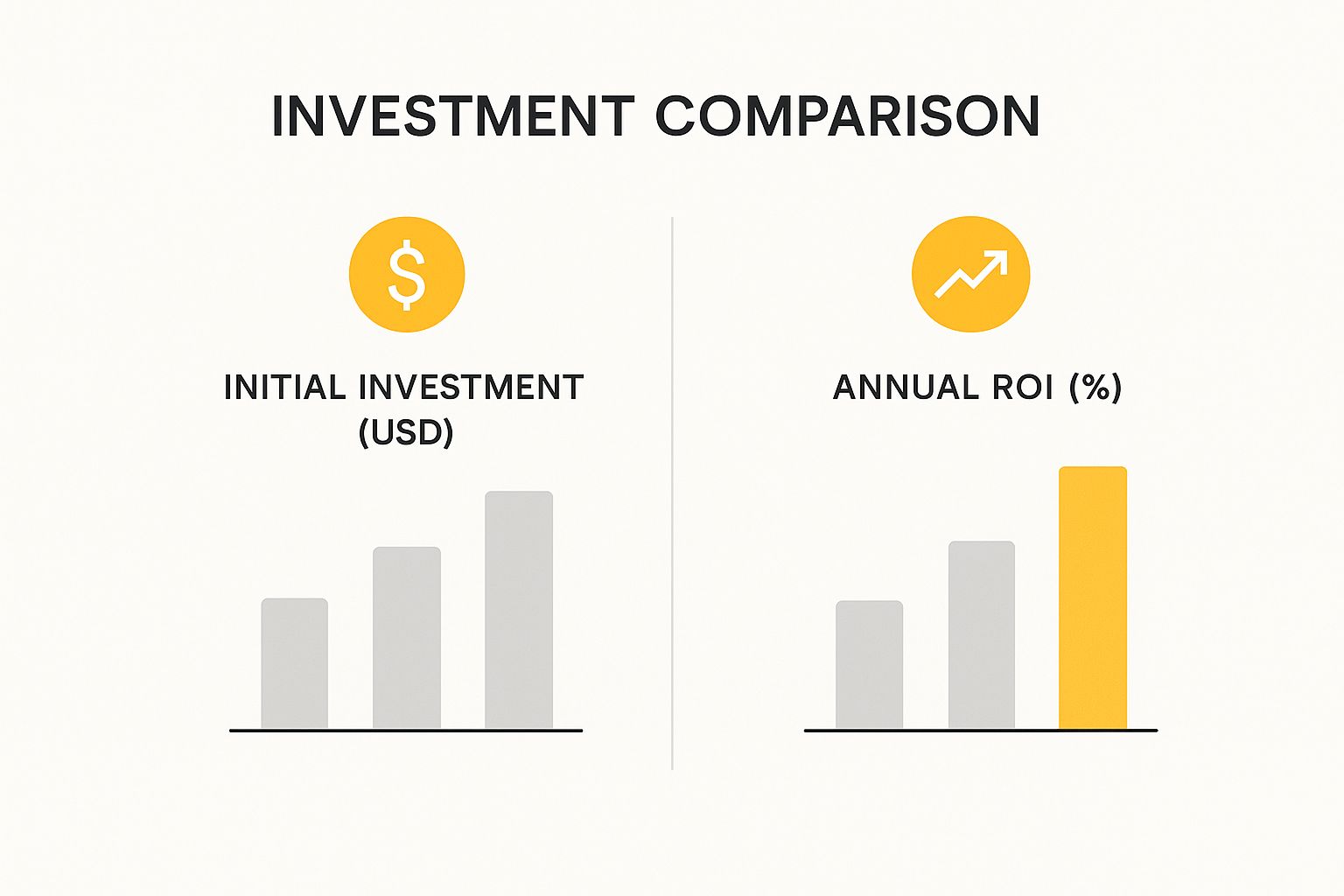
The data here clearly shows that while a residential development might be easier to get off the ground with less capital, a strategically located commercial project can deliver a much higher return on investment.
Creating a Business Plan That Sells
Think of your business plan as your most important sales pitch. It needs to be professional, thorough, and completely convincing. Your goal is to tell a compelling story about your project's future success, backed up by hard data and sensible financial projections.
I see too many developers treat the business plan as a box-ticking exercise. That’s a huge mistake. A meticulously researched and professionally presented plan is often the single most critical factor that sways the loan committee.
For example, don't just write "the project will be profitable." Instead, show them: "Based on current market prices of 14,000 MAD/m² in the Targa district and projected construction costs of 7,500 MAD/m², we anticipate a gross profit margin of 46% per unit. Our sales forecast projects a full sell-out within 18 months of completion." That level of detail proves you've done your homework.
Looking Beyond Traditional Bank Loans
While a bank loan is often the main pillar of your financing, don't stop there. Exploring other avenues can create a much stronger and more flexible financial structure for your project.
Comparison of Real Estate Financing Options in Morocco
Navigating the funding landscape requires understanding the different tools at your disposal. This table breaks down the most common financing routes for a 'projet immobilier maroc', outlining their key features and where they fit best.
| Financing Option | Key Features | Best Suited For |
|---|---|---|
| Traditional Bank Loans | Structured lending based on project viability and developer's contribution. Competitive interest rates. | Most standard residential and commercial projects with a solid business plan and experienced developer. |
| Developer Partnerships | Collaboration with established local firms. Provides access to their credit lines and industry credibility. | Newcomers to the market or those undertaking large-scale projects requiring deep local expertise. |
| Private Equity | Injections of significant capital from investment funds in exchange for equity. | Large, high-return projects like luxury resorts, large commercial centres, or major housing developments. |
| Off-Plan Sales (VEFA) | Pre-selling units to buyers. Their instalment payments help fund ongoing construction work. | Residential projects in high-demand areas, as it significantly reduces reliance on debt. |
Each option has its place. The savviest developers often create a hybrid model, blending two or more of these sources to build a resilient financial base for their project.
The Moroccan government also frequently rolls out programmes to spur growth in the real estate market. A great example is the 'Dâam Sakane' programme, which offers direct financial aid to Moroccans buying their first home.
While this subsidy goes directly to the homebuyer, you as a developer can absolutely use this to your advantage. By designing and building properties that meet the programme's criteria, you instantly expand your pool of potential buyers and can significantly speed up your sales.
Ultimately, building a powerful financing strategy is about layering these different options. By combining a traditional bank loan with your personal capital and the cash flow from VEFA sales, you create a robust financial model. This approach helps you weather any unexpected delays or market shifts, ensuring your projet immobilier maroc is well-capitalised from the moment you break ground to the final handover.
Managing Project Execution And Sales
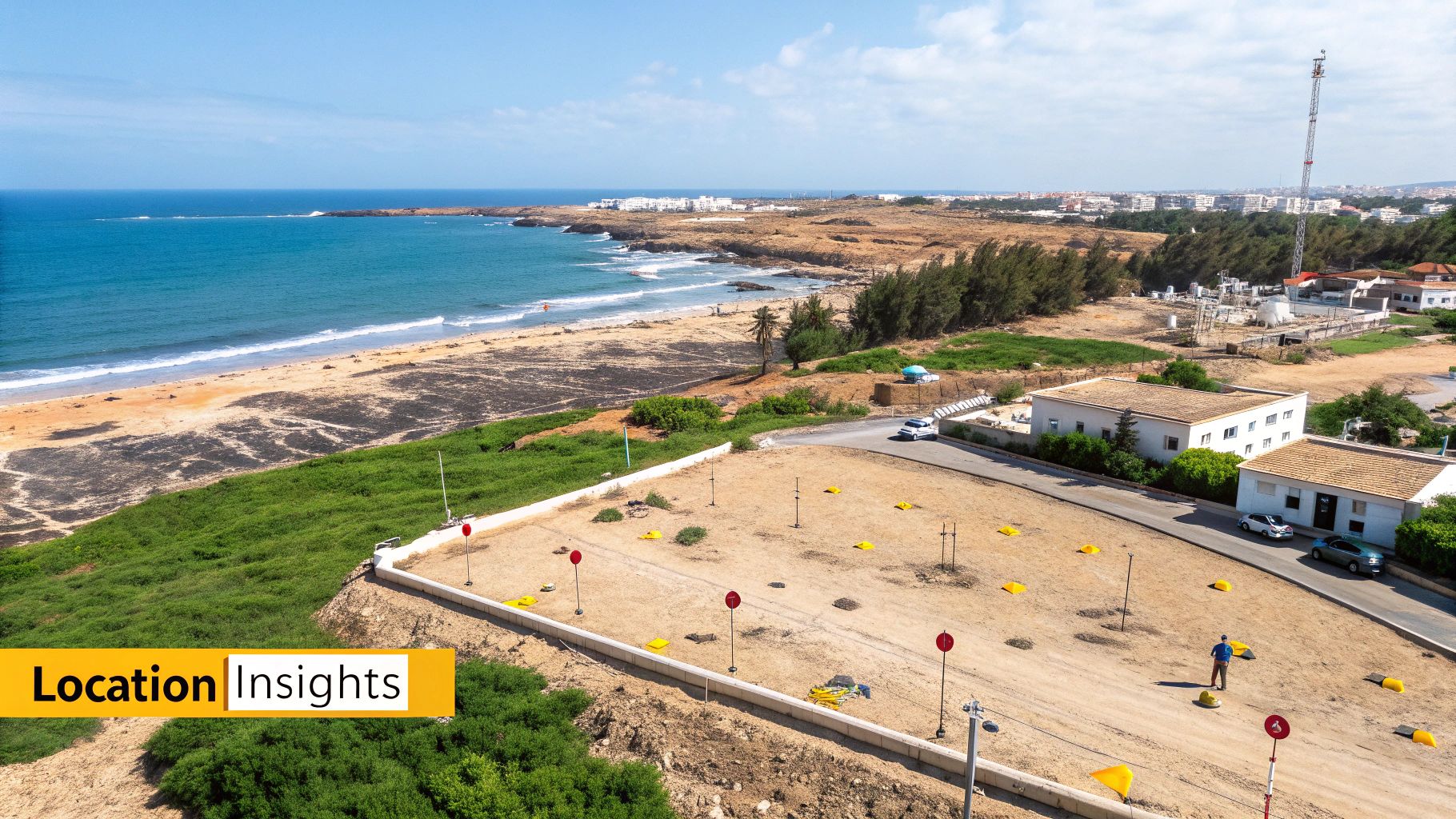
With financing approved and the legal paperwork sorted, your projet immobilier maroc starts to take shape. This is where the plans on paper become bricks and mortar. Now, everything hinges on disciplined project management and a savvy sales strategy. Your success will come down to how well you can manage people, timelines, and budgets, all while drumming up serious market interest.
First things first, you need to assemble your A-team. This goes way beyond simply hiring contractors. You’re building a partnership with reliable professionals who genuinely understand your vision and the nuances of the local market. Choosing the right architect, engineers, and construction firm is probably the single most critical decision you'll make at this stage.
My advice? Look for companies with a solid, verifiable track record on projects similar to yours in the region. Don't just take their word for it. Check their references, go visit their past projects, and make sure they have all the necessary insurance and certifications in place. This due diligence upfront can save you a world of pain and unexpected costs later on.
Overseeing Construction With Precision
Being an effective project manager means being hands-on. You simply can't afford to be a passive bystander. This means setting up crystal-clear communication channels and sticking to a regular schedule of site visits and progress meetings. Your job is to make sure the project sticks to the plans, the budget, and the timeline—no excuses.
A detailed project schedule with clear, tangible milestones is your best friend here. For example, I always tie contractor payments directly to the successful completion of specific phases. Think foundation poured, structural work signed off, plumbing installed. It’s a powerful motivator for keeping everyone on schedule.
Quality control is another area where you have to be relentless. Regularly inspect the work yourself. Better yet, bring in an independent technical controller, known locally as a 'bureau de contrôle'. Their sole purpose is to verify that the construction meets all technical standards and building codes. This ensures your final product is not only beautiful but also safe, durable, and up to spec.
The secret to staying on budget is anticipating costs, not just tracking them. A 15-20% contingency fund isn't a luxury; it's a necessity for dealing with the inevitable surprises that arise during construction.
Crafting A Powerful Sales And Marketing Strategy
Building a fantastic property is only half the job. You also have to sell it. In the current Moroccan market, you can't just wait for buyers to show up; you need a proactive and compelling sales approach.
While property prices have held relatively steady, the latest market analysis from 7news.ma paints a very clear picture. Housing prices only inched up by 0.1%, but the total number of real estate transactions plummeted by a staggering 21.2% year-over-year. Digging deeper, residential sales specifically shrank by nearly 26%. This tells us that buyers are being much more cautious, which makes a strong marketing push absolutely essential.
To grab the attention of today's discerning buyers, your strategy needs to be targeted and multi-layered.
- Know Your Buyer: Who are you selling to? Is it young professionals in Casablanca? European retirees looking for a second home in Agadir? Understanding their lifestyle, needs, and where they spend their time online is the foundation of your entire plan.
- Go Digital: High-quality 3D renderings and virtual tours are no longer optional. Invest in targeted social media campaigns on platforms like Instagram and Facebook to get your project in front of the right people.
- Create a Professional Sales Hub: A well-designed on-site sales office, or 'bulle de vente', gives you a professional space to meet with potential clients, answer questions, and truly showcase the quality and vision of your project.
Utilising The VEFA System For Pre-Sales
One of the smartest financial tools available to developers in Morocco is the VEFA ('vente en l'état futur d'achèvement') system. In short, it allows you to sell properties off-plan, before they’re even built. This is a game-changer for your project's cash flow. The instalment payments you receive from these early buyers can help finance the ongoing construction, significantly reducing your dependency on bank loans.
For a VEFA strategy to work, it all comes down to transparency and trust. You must provide buyers with meticulous plans, a clear and realistic construction timeline, and all the required legal guarantees. When done right, a VEFA campaign not only secures crucial funding but also builds incredible market buzz and validates the demand for your project long before the ribbon-cutting ceremony. Partnering with a skilled real estate agency can be a huge asset in managing your VEFA sales and marketing efforts.
Got Questions About Moroccan Real Estate? We've Got Answers
Stepping into a projet immobilier maroc for the first time? It’s completely normal to have a long list of questions. Getting clear, honest answers is the only way to move forward with real confidence.
We've worked with countless investors and developers, and a few key questions always come up. Let's tackle them head-on so you can stop worrying about the unknowns and start focusing on what really matters: bringing your project to life.
Can a Foreigner Actually Own Property in Morocco?
Yes, absolutely. This is one of the biggest myths we have to bust. As a foreign national, you can purchase and fully own titled property—known as 'Titre Foncier'—with the exact same rights as a Moroccan citizen. Your investment is legally protected, giving you solid ground to stand on.
The one major exception is agricultural land. Foreigners can't own it outright. But you can still get involved by leasing it on long-term contracts, often up to 99 years.
My advice? Before you sign anything, always double-check the land's official zoning status with the local urban agency. You need to be 100% certain it isn't classified for agricultural use. It's a simple step that can save you from a world of headaches.
What Taxes Should I Expect on a Real Estate Project?
Getting your head around the tax side of things is non-negotiable for a profitable project. The taxes kick in at different stages, so you need to plan for them from day one.
Here’s a quick rundown of the main taxes to keep on your radar:
- When you buy: The initial purchase involves registration fees and land registry taxes. Your notary will typically handle these, but they are a key part of your acquisition costs.
- While you build: As you start construction, you'll be paying Value Added Tax (VAT or 'TVA') on just about every material and service. This needs to be built into your construction budget from the very beginning.
- When you sell: Once you sell the finished properties, you’ll be taxed on the profit. If a company owns the project, it falls under corporate income tax ('IS'). If you’re operating as an individual, you'll pay income tax on real estate profits ('TPI').
The tax system can be tricky, and getting it wrong can seriously eat into your returns. That's why working with a local Moroccan tax advisor isn't just a good idea—it's essential for setting up your project for financial success.
How Does the VEFA System Work?
VEFA ('Vente en l'État Futur d'Achèvement') is Morocco's legal framework for selling property off-plan. It’s an incredibly useful system that lets you sell units before they're even built, providing a structured and secure process for everyone involved. For developers, it's a game-changer for financing a projet immobilier maroc.
Think of it this way: instead of relying entirely on bank loans, you can use the deposit and instalment payments from your buyers to fund the construction. It significantly improves cash flow. The whole system is tightly regulated by law, which protects both you and your buyers.
The VEFA process is built on a few core pillars:
- A rock-solid contract that details every single specification of the property.
- A payment schedule, fixed by law, that links the buyer's payments to clear construction milestones being met.
- A mandatory financial guarantee from you, the developer, to safeguard the buyer's funds.
Using the VEFA model can be a massive boost to your project's financial health, but it requires you to follow the legal playbook to the letter. It’s all about compliance and building trust with your buyers.
At Rich Lion Properties, we live and breathe Moroccan real estate. Our team is here to guide you through every step, whether you're buying, selling, or developing. We provide the on-the-ground expertise you need to make your transaction a success. Find out how we can support your project by visiting our website at https://richlionproperties.com.
